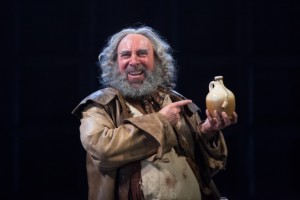
Falstaff and his jug
Thursday was Henry IV Part 2 at the RST.
It seemed to me as I watched Henry IV Part 1 that the passion for clarity that is the RSC’s house style might work better the closer to the center of the canon you get. It also helped to have a real star, around which everyone can rotate.
Antony Sher’s Falstaff owned the stage at the RST on Thursday night. Both plump and stately, he spent the production straggling with threats to his hedonistic independence, both from assorted legal authorities including the Lord Chief Justice and finally more drastically from his one-time protege Prince Hal. Sher’s expansive, gorgeous voice and patient, generous stage presence, whether expounding his own wit or the manifold virtues of sherry, filled the not-very-full theater. I was glad to be there, especially when he was talking.
There can be something a bit sad about seeing a good production in a not-full theater, and that particular pathos was accented by the best of the episodes in the play, the rural scenes with Justices Shallow and Silence. Oliver Ford Davies’s Silence, especially, presented a moving mixture of nostalgia and false bluster. I found his entanglement with his old Inns of Court buddy Falstaff — each tries to swindle the other, but each is also caught up in his own nostalgia-addled delusions — oddly touching. Falstaff wants the judge’s money, and Shallow wants Falstaff’s presumed court connections. Both end up empty-handed, but Shallow’s awkwardness, his excitable bouncing knee when he recalled the exploits of the bona robas, and his muted affection for both the new friend Silence and the old Falstaff, communicated real human emotion, albeit governed by misprision.
I wasn’t as seduced by Elliot Johns-Worrel’s Prince Hal. This is the play in the sequence where the roguish boy grows up, but in this production that maturity mostly entailed withdrawal and emotional deadening. Only in his denunciation of Falstaff, featuring the last of a long series of fat jokes — “know the grave / Doth gape for thee thrice wider than for other men” — did some emotion threaten to spill out of this performance. Not anger, so much as deep sadness and regret that cannot be allowed to become visible. It was as if the prince, too, realized that Falstaff was the star of the show, and in banishing him he was dropping the curtain on a whole dramatic mode.
It may be problem that we love Sher’s Falstaff too much. He was so charismatic and lovable that he wasn’t a tangible political threat, so Hal’s exiling him seemed unecessary. The fat knight was plenty corrupt, believing the laws of England to be at his commandment, but the harshest of his crimes — swindling Shallow and misusing his authority to press men into armed service — were mostly played for laughs.
I did hear a new thing in the final confrontation: when Falstaff desperately climbed the rhetorical ladder trying to get Hal’s attention — “My King, my Jove, I speak to thee, my heart!” — Sher hit the intimacy of the form of address, which is what gets the Prince to turn and denounce. Kings don’t often get called “thee,” even by knights.
In our disillusioned, democratic, and largely anti-martial world, we love Falstaff, probably more than the play does. The virtues of sherry, wit, and pleasure speak to us more directly than conques, order, and rectitude. As Falstaff dominated this play, however, I wonder about the distribution of stage charisma between prince and knight. Hal of course dominates the next play in the series — but I wonder what would happen if he really made a forceful attempt on this play also.
Friday was The Roaring Girl at the Swan.
Last was best, much to my surprise. I’d heard mixed-to-bad reviews of this production, and I even wondered if I would have been better off changing my seat to watch Henry IV Part 1 in the RST. I didn’t switch — I’d never seen The Roaring Girl before, though I used to teach it sometimes — and I’m glad. What a joyous, energetic, exciting production to waft me back over the Atlantic!
Lisa Dillon’s Moll Cutpurse was the star, and she played the part with charismatic flair, but she didn’t big-foot the other actors as Sher nearly did. I came away thinking about the joys of a real ensemble performance, in which every part, no matter what size, owns its moments on stage. Moll was the center of a complex mix of deceptions, seductions, and interlocking sex-and-money plots, but she didn’t cast her shadow over the other players. Opening and closing the play on stage alone, smoking, she facilitated and also stood apart from the city comedy love plots.
More than any of the four plays I saw this week, I felt the RSC’s mania for clarity really helped this production. It’s a sub-plot rich environment, with lots of swindling and deception, and the professional clarity was welcome. But unlike The White Devil, in which I felt the RSC actors were fighting as hard as they could just to get the plot out on stage, in Roaring Girl they danced all of it, with happy bounces in their collective steps. Maybe a satiric comedy is easier to play joyfully than a revenge tragedy, or maybe — as someone suggested to me at lunch — the White Devil cast is still in previews and hasn’t really gelled yet. In any case it was great to see a show that felt complete. It reminds you what theater can do at its best. Even among the grumpy professoriate, almost everyone walked out of the theater and over to the pub happy.
My favorite scene was also probably the hardest to perform: Moll and Trapdoor’s dialogue in Thieves’ Cant (5.1), the possibly historical secret language of rogues and card-sharps in early modern London. (Way back in 2004, I worked on a project on Elizabethan criminals, and used to know this vocabulary pretty well.) It’s a linguistically difficult scene, even though Moll translates most of the cant terms, and I wondered if they could pull it off without confusing the house. In a wonderfully goofy move, they staged the cant exchange as an epic rap battle, and turned the scene into a dance party, which they also reprised at the close in a faux-Elizabethan disco jig.
Really a great way to end the week at Stratford!
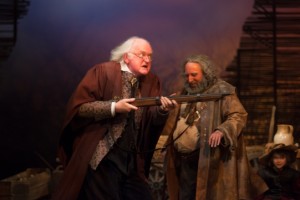
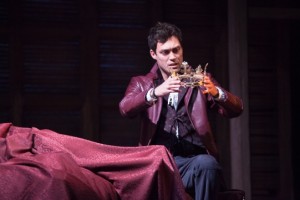
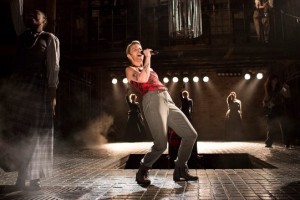
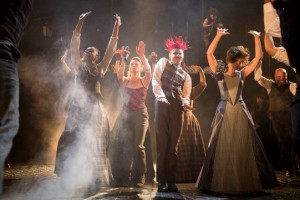
Leave a Reply